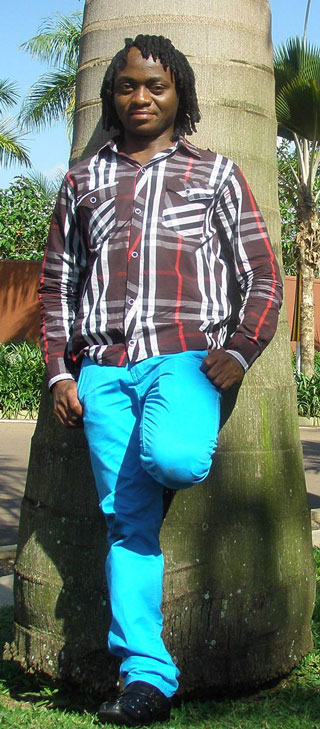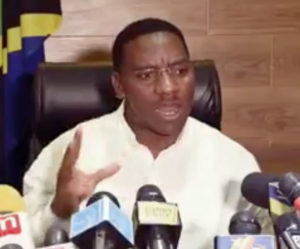Many African LGBT activists urge Western donors not to cut off aid to Tanzania or other homophobic African nations, even when those countries launch anti-gay crackdowns. But not everyone agrees.

Joseph Saidi before he was tortured and fled to Sweden.
Anthony Oluoch, program manager for the LGBT+ rights organization Pan Africa ILGA, made the case for continued foreign aid to Tanzania in a statement titled “Withholding aid to Tanzania is a bad idea: LGBT+ Tanzanians will lose out and become scapegoats if donors cut aid.“
That statement was endorsed by representatives of 10 organizations in Tanzania, where repression of LGBT citizens has been increasing since John Magufuli was elected president in 2015.
His statement was published after Denmark cut off foreign aid to Tanzania ($9.8 million a year),Canadian officials said they were considering taking the same step ($125 million a year), and the World Bank suspended its missions to Tanzania.
East African LGBT rights activist Joseph Saidi disagrees with the idea that continued aid is a benefit to LGBT Tanzanians. Having fled from violence in Africa, Saidi writes from Sweden:
As a victim of the anti-gay law in Uganda in 2014, I was arrested, beaten and tortured by the police and attacked by mob justice. That why I don’t agree with this message.
I think the only way to improve the lives of LGBT people in Tanzania is to continue cutting aid.
I call all Western countries to cut their aid to Tanzania, even cut diplomatic relations if possible.
LGBTI rights are human rights. We have been treated like animals, killed and tortured. Enough is enough.
The change is now and not tomorrow. There is no more life to lose.
Saidi was the founder of the LGBT advocacy group Rainbow Sunrise Mapambazuko in the eastern section of the Democratic Republic of the Congo. He is currently a member of RFSL, the Swedish Federation for Lesbian, Gay, Bisexual, Transgender and Queer Rights.
The position of RFSL on international aid is closer to Oluoch’s than to Saidi’s.
RFSL states on its website:
A few weeks ago, the governor of Dar Es Salaam in Tanzania, threatened to round up and arrest LGBTQ people, calling on the public to identify and report anyone they knew to be LGBTQ. These statements have escalated fear among the LGBTQ community and contributed to an already deteriorating human rights environment for LGBTQ people across the country. There has since been much international attention paid to the situation in Tanzania.
Tanzania continues to criminalize homosexual acts with up to 30 years in prison through a British colonial-era anti-sodomy law. The statements made by the governor are not isolated and are part of the growing crackdown against LGBTQ people, and a larger trend of repression against journalists, political opposition leaders, and a shrinking space for civil society in the country.
While RFSL does not have any formal partnerships with LGBTQ organisations in Tanzania, we have closely followed the development of events through our contacts, cooperation with organisations in the region, and through other organisations that work directly with LGBTQ groups in the country.
State sanctioned violence and discrimination against LGBTQ people is a human rights violation. We at RFSL, along with many people in Sweden, are seriously concerned by the statements of the governor of Dar Es Salaam and the worsening situation for LGBTQ Tanzanians.
Paul Makonda, the regional commissioner of Dar es Salaam, launched Tanzania’s latest anti-gay panic by announcing plans for a gay “round-up.” (Photo courtesy of The Citizen)
These events, specifically the governor’s statements, have led to a debate on whether countries which currently provide developmental assistance to Tanzania should respond by withdrawing aid to the country. These conversations have taken place in the media within the international community in Sweden, as well as in other donor countries such as Denmark, Norway, and Canada.
LGBTQ organizations in Tanzania however are voicing that there are potential risks involved in such actions from Sweden and other donor countries. Several actors that RFSL have spoken to are strongly critical of the withdrawal of developmental aid as a response to the situation, recognizing that such actions are problematic in many ways and could even make things worse, not only for LGBTQ people but others whose lives benefit from aid.
Additionally, there could be even more retaliation against the LGBTQ community if the reduction of aid is directly linked to LGBTQ rights and people. Political leaders, the general public, and other civil society organisations could shoulder the blame on LGBTQ people, and accuse them of being the reason for the reduction in aid.
The withdrawal of aid could also increase diplomatic tensions between Tanzania and other countries, jeopardizing opportunities for engagement in constructive dialogue and potential avenues of positive diplomatic influence. Furthermore, this response may also harm other human rights defenders and civil society organizations that receive aid and support.
Before any steps are taken in relation to Sweden’s decision on how to structure aid to Tanzania, it is vital to consult with local activists and organisations to fully understand the consequences of such actions to the LGBTQ community. Consideration should also be given to how best to direct aid and assistance so that human rights defenders are prioritized and can continue their work in the country.
Related articles:
- Commentary: Withholding aid to Tanzania is a bad idea (November 2018, RightsAfrica.com)
- LGBT activist from Congo arrested, beaten in Uganda (
- Congo: LGBT activists arrested, beaten, released (May 2013, 76crimes.com)

COMMENTS